It’s different on the other side. It's still Spain, it's still Andalucía, but it’s just out of Málaga province and into Granada. And everything is different.
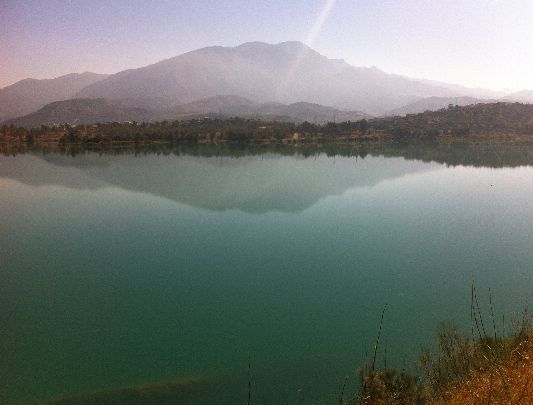
To get there, the road first goes south and round the bottom of Viñuela, that lovely body of water with its reflections and its mountainous backdrop. Gentle, picturesque, belying what comes later.
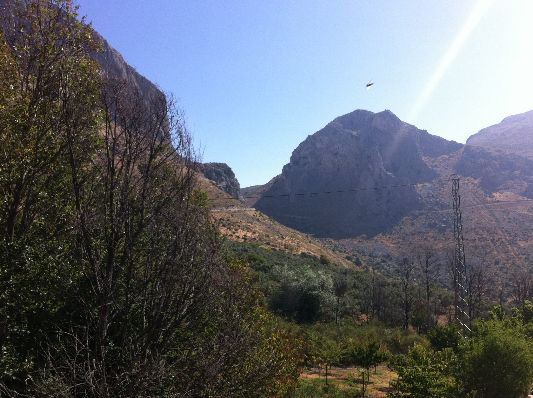 From there you climb, winding upwards, with views in all directions, pausing to marvel at the craggy rocks above. The great gap, the Zafarraya Pass, is in view, then disappears, teasing you and drawing you upwards around yet another bend. Higher, until there is nothing beside the road except rock and harshness.
From there you climb, winding upwards, with views in all directions, pausing to marvel at the craggy rocks above. The great gap, the Zafarraya Pass, is in view, then disappears, teasing you and drawing you upwards around yet another bend. Higher, until there is nothing beside the road except rock and harshness.
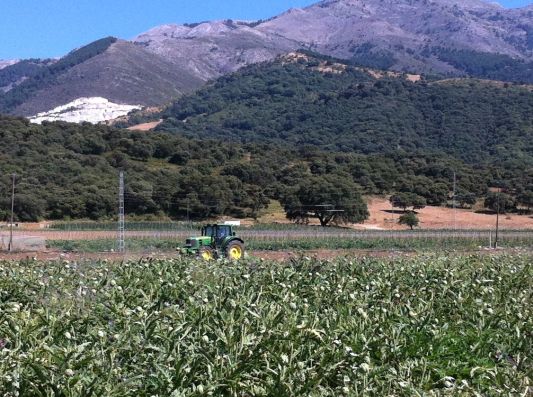 Suddenly without warning, you are through the gap. Ventas de Zafarraya, a small settlement, once important, then faded, now reviving through the success of the agricultural co-operative. It's blowy up there as you cross into Granada province. The gap creates a wind-tunnel from which there is no escape. Turning east out of the small town, the landscape opens. Big skies, huge flat agricultural lands, fertile due to sitting in a massive rock basin, but harsh, with no shelter.
Suddenly without warning, you are through the gap. Ventas de Zafarraya, a small settlement, once important, then faded, now reviving through the success of the agricultural co-operative. It's blowy up there as you cross into Granada province. The gap creates a wind-tunnel from which there is no escape. Turning east out of the small town, the landscape opens. Big skies, huge flat agricultural lands, fertile due to sitting in a massive rock basin, but harsh, with no shelter.
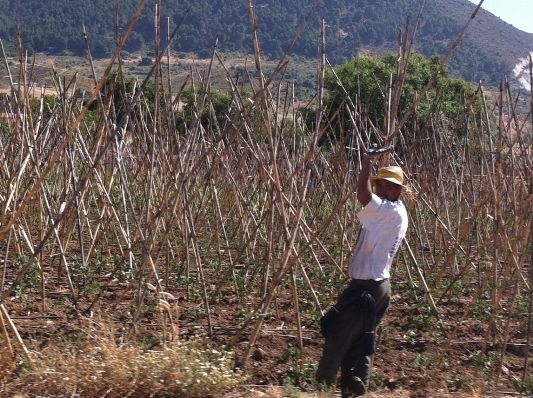 Miles of rows of vegetables. Warehouses, tractors, rough accommodation blocks for the seasonal labourers. Masses of activity under the blazing July afternoon sunshine. Very hot, very hard. Despite 60% unemployment amongst young people in Andalucía, this work is too tough for most, so others with extraordinary stamina travel from north Africa for 8-week stints to harvest the crops. They spend almost nothing while living in the huts, and take their hard-earned money home to their families across the Strait of Gibraltar.
Miles of rows of vegetables. Warehouses, tractors, rough accommodation blocks for the seasonal labourers. Masses of activity under the blazing July afternoon sunshine. Very hot, very hard. Despite 60% unemployment amongst young people in Andalucía, this work is too tough for most, so others with extraordinary stamina travel from north Africa for 8-week stints to harvest the crops. They spend almost nothing while living in the huts, and take their hard-earned money home to their families across the Strait of Gibraltar.
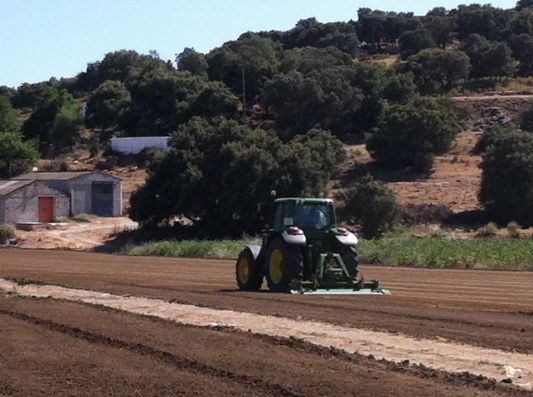 The tractors plough up and down, flicking sharp stones from under the wheels. The earth is not deep, but the underground water and the rich sediment provide sustenance - the crops are plentiful and the warehouses fill quickly. This area at an altitude of 1,000 metres has an extended season for vegetables, and the success of the HortoVentas co-operative of over 400 member farmers has ensured that the local population is increasing again, with other businesses springing up to supply the co-op’s ancillary needs.
The tractors plough up and down, flicking sharp stones from under the wheels. The earth is not deep, but the underground water and the rich sediment provide sustenance - the crops are plentiful and the warehouses fill quickly. This area at an altitude of 1,000 metres has an extended season for vegetables, and the success of the HortoVentas co-operative of over 400 member farmers has ensured that the local population is increasing again, with other businesses springing up to supply the co-op’s ancillary needs.
Tomatoes, artichokes, cauliflower, beans, pepper, lettuce, cabbages, courgettes, chives and celery. Unusually nowadays, the vast majority of the crops are still grown outdoors, avoiding the “plastic city” areas popping up elsewhere (notably in 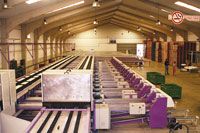 Almería), and delivering stronger flavours and colours which ensure the products are pre-ordered by buyers seeking the highest quality. In 2004 an increase in membership of the co-operative enabled a €1.6m investment - a new canning plant and better facilities for the employees and seasonal workers boosted productivity. HortoVentas is famous for its flavoursome, dark green tomatoes – over 7.5 million kilos produced annually. http://www.hortoventas.com/index.php/actualidad/27-video. The 400+ co-operative members are mostly small, specialist farmers, benefitting from the economies of scale of irrigation, machinery, marketing and distribution that the co-op offers.
Almería), and delivering stronger flavours and colours which ensure the products are pre-ordered by buyers seeking the highest quality. In 2004 an increase in membership of the co-operative enabled a €1.6m investment - a new canning plant and better facilities for the employees and seasonal workers boosted productivity. HortoVentas is famous for its flavoursome, dark green tomatoes – over 7.5 million kilos produced annually. http://www.hortoventas.com/index.php/actualidad/27-video. The 400+ co-operative members are mostly small, specialist farmers, benefitting from the economies of scale of irrigation, machinery, marketing and distribution that the co-op offers.
After the flatlands the road winds on to Alhama de Granada, a wealthy town, the only one for miles. Hot springs led to Roman baths being established, followed by Arab baths in the 15th century. A spa hotel offers luxury treatments, while just outside it by the stream a pool accessible from the footpath offers a free (albeit rather public) hot spring experience. A third option is the Arab baths at El Ventorro, in a beautiful woodland setting. The dramatic gorge offers spectacular views – beautiful, yet at the same time emphasising the harsh cragginess of the landscape.
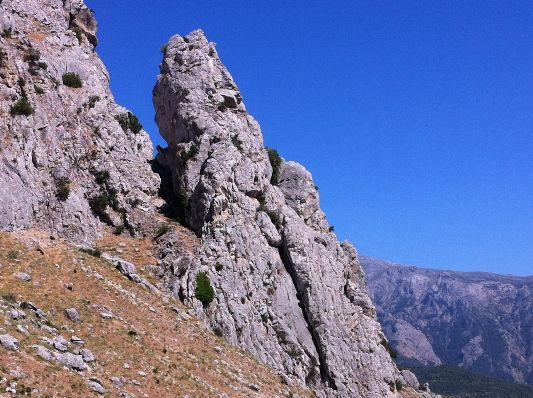
The drive back between the crops allows a closer look at the huge variety being grown. Then back through the pass. Looking downward over the rolling tree-covered Axarquía hills towards the touristy Mediterranean resorts it feels like a different world. Prettier. Easier. An easier life, this side of the Zafarraya Pass.
© Tamara Essex 2013
THIS WEEK’S LANGUAGE POINT:
I’m struggling this week. My teacher, Juan-Mi, is pushing me on those verbs that talk about your emotions and your abilities. I’m OK with “Me da miedo” (it frightens me, or literally “it gives me fear”), but cannot work out why sometimes it needs to be “Se me da mal cocinar” for example. “I’m rubbish at cooking”, or literally “Cooking gives it bad to me” or something like that! I suppose I just have to learn it, but I know I learn better when I can see a glimmer of logic, and this one has me stumped. Anyone got any tips for me on this?